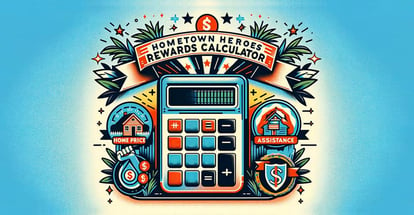Can You Get an FHA Loan if Self Employed in Florida?
Despite the unconventional nature of this route, it's important to know that FHA loans are indeed accessible to those who run their businesses.
This article delves into the intricacies of applying for an FHA loan as a self-employed person in Florida, highlighting the additional criteria and preparation steps involved compared to traditional employees.
Here, you'll find valuable insights to guide you through your FHA loan application process, tailored for the distinct needs of self-employed individuals.
Table of Contents
- Can You Get An FHA Loan While Self-Employed in Florida?
- How to Qualify for an FHA Loan When You're Self-Employed in Florida
- Essential Tips for Self-Employed FHA Loan Applicants in Florida
- What Are the Rules for Self-Employment Income for FHA?
- Does FHA Require a Balance Sheet for Self-Employed Individuals?
- Is It Harder to Get a Home Loan Being Self-Employed?
- What Is the Minimum Income for an FHA Loan?
- Bottom Line
Can You Get An FHA Loan While Self-Employed in Florida?
Self-employed individuals in Florida can indeed secure a Federal Housing Administration (FHA) loan and possibly obtain a mortgage.
While the unique nature of self-employment may present more complex standards to meet, it certainly doesn't disqualify you from mortgage opportunities.
Specific criteria must be fulfilled for those running their businesses to be eligible for an FHA loan. This includes holding a minimum of 25% ownership in the business, maintaining a favorable debt-to-income ratio, and providing comprehensive financial documentation to demonstrate your eligibility.

How to Qualify for an FHA Loan When You're Self-Employed in Florida
Qualifying for a Federal Housing Administration (FHA) loan as a self-employed individual in Florida involves meeting certain financial criteria, providing proof of your business's legitimacy, and submitting required documentation.
Below is a detailed guide to help you navigate these requirements.
Financial Requirements
To be eligible for an FHA loan while self-employed, you must satisfy these financial prerequisites:
-
Credit Score - A minimum credit score of 500 is required.
-
Down Payment - You must make a minimum down payment of 3.5%.
-
Bankruptcy History - No bankruptcies have been filed in the last two years.
-
Income Verification - You must demonstrate sufficient income from a business with at least a 25% ownership stake.
- Debt Management - If business-related debts are reflected in your credit history, it’s crucial to show that your business has a viable plan to manage and address these debts.
Proof of Business
Verifying your business’s operational status is a key aspect of the FHA loan application process. The lender needs to confirm that your business has been operational for at least 2 years.
This can include businesses categorized as sole proprietorships, limited liability corporations, partnerships, or corporations.
Different lenders may have varied requirements for proving your business's legitimacy. Commonly requested items include:
-
Business License - Official documentation that legally permits the operation of your business.
-
Verified Commercial Address - Proof of a physical location where your business operates.
-
Professional Memberships - Involvement in organizations related to your industry.
- Business Insurance - Appropriate insurance policies that cover your business.
Other Documentation Requirements
In addition to proving your business's legitimacy, you are required to submit various financial documents:
-
Tax Returns - The last two years of tax returns are typically requested to assess your income stability.
-
Profit and Loss (P&L) Statements - This year’s P&L statements can provide a current view of your business’s financial health.
- Personal Bank Statements - These statements cross-verify the income and expenses claimed in your other documents.
Remember, each lender may have specific nuances in their requirements, so it’s crucial to communicate clearly with your chosen lender to understand exactly what is needed for your FHA loan application.
By preparing these documents and meeting the outlined criteria, self-employed individuals in Florida can successfully navigate the FHA loan application process.
Essential Tips for Self-Employed FHA Loan Applicants in Florida
Phil Ganz and Ryan Skerritt, FHA loan experts in Florida, emphasize several key strategies for self-employed individuals aiming to secure an FHA loan. First, they advise shopping around with various lenders.
Since FHA loans are offered through commercial lenders, each can have differing rates and fees. It's crucial to compare these to find the best fit for your financial needs.
Improving your debt-to-income ratio (DTI) is another significant step. Although FHA loans accommodate DTIs as high as 57%, a lower ratio benefits your financial health and strengthens your loan application.
Additionally, focusing on your credit profile is critical. Ensure your credit score and history are in good shape, address any outstanding debts, and keep up with current credit payments. If necessary, delay your loan application to enhance your credit score for better loan terms.
Ganz and Skerritt also highlight the importance of a larger down payment. Saving more for your down payment can reduce your monthly mortgage payments, making the loan more manageable and reducing the income required to qualify.
Lastly, they recommend meticulously documenting your business history. This includes proving that you have owned at least 25% of a profitable business for at least two years and showcasing your journey as a responsible and successful entrepreneur.
What Are the Rules for Self-Employment Income for FHA?
For self-employed individuals seeking an FHA loan, understanding the rules for documenting self-employment income is crucial. The FHA has specific requirements to ensure the borrower has a stable and reliable income source.
The fundamental requirement is to provide two years of personal and business tax returns. This comprehensive documentation helps lenders assess the stability and consistency of the self-employed income over a significant period.
However, certain conditions can modify this requirement:
-
Trend in Personal Income - If the personal tax returns show an increasing trend in income over the past two years, the FHA may not necessitate business tax returns. This scenario is often interpreted as a positive indicator of financial stability and growth in self-employment.
- Source of Down Payment and Closing Costs - When the funds for the down payment and closing costs are sourced from personal rather than business accounts, the borrower might be exempted from submitting business tax returns. This simplifies the process, indicating a clear separation between personal and business finances.
Accurate and comprehensive tax documentation is vital for self-employed applicants. Any inconsistencies or gaps in the documentation can pose challenges during the loan approval process.
Additionally, maintaining distinct personal and business financial accounts can aid in clearly demonstrating the source of funds for home purchase-related expenses.
While the FHA generally requires two years of personal and business tax returns to document self-employment income, there are exceptions based on income trends and the source of home purchase funds.
Self-employed individuals should prioritize clear and meticulous financial record-keeping to streamline their FHA loan application process.
Does FHA Require a Balance Sheet for Self-Employed Individuals?
Regarding FHA loans, self-employed individuals often have specific documentation requirements.
As of July 7, 2022, if more than a calendar quarter has elapsed since the end of the most recent tax period (either calendar or fiscal year-end), the FHA mandates that mortgagees obtain a year-to-date Profit and Loss (P&L) statement.
This is a crucial requirement for assessing the current financial health of a self-employed applicant.
However, there is an important distinction for self-employed individuals who report their income using Schedule C regarding the need for a balance sheet. In these cases, the FHA does not require a balance sheet.
This exemption simplifies the application process for many self-employed borrowers, as creating a balance sheet can be complex and time-consuming.
The focus, therefore, for self-employed applicants should be on ensuring their P&L statement is up-to-date and accurately reflects their current financial situation.
While the balance sheet is not required for those filing Schedule C income, the P&L statement is essential in the FHA's evaluation of financial stability.
In summary, FHA requires an updated P&L statement for self-employed individuals if a significant amount of time has passed since the last tax period. Still, a balance sheet is not required for those who file Schedule C income.
Consulting with a mortgage professional is always recommended to ensure all FHA requirements are met and to understand the documentation needed for each individual's unique situation.
Is It Harder to Get a Home Loan Being Self-Employed?
Obtaining a home loan as a self-employed individual may seem daunting, but it's important to recognize that it does not automatically complicate the mortgage approval process.
The key to a smooth experience lies in thorough preparation and an understanding of the specific requirements for self-employed borrowers.
The primary focus for lenders is the stability and reliability of income. Since self-employed income can appear more variable than salaried employees, providing accurate documentation to verify income is crucial.
This usually involves submitting tax returns, Profit and Loss (P&L) statements, and other relevant financial documents demonstrating a steady income flow.
Lenders typically assess a self-employed individual's income by averaging it over the past two years or examining year-to-date earnings. Keeping financial records organized and current is beneficial for this process.
The debt-to-income ratio (DTI) is another crucial factor. Like any borrower, self-employed individuals must have a DTI ratio within the lender's acceptable limits. Strategies like reducing personal debt and maintaining a strong credit score are beneficial in meeting these criteria.
In conclusion, while there are unique considerations for self-employed individuals seeking a home loan, it doesn't necessarily make the process harder.
Understanding lender requirements, keeping financial records well-organized, and knowing how your income will be assessed are crucial steps.
Self-employed individuals can successfully navigate the home loan approval journey with appropriate preparation and documentation.
What Is the Minimum Income for an FHA Loan?
The FHA loan program, known for its flexibility, does not establish a minimum or maximum income limit for borrowers. This lack of a set income requirement allows the program to cater to various financial situations, making it accessible to a diverse group of potential homeowners.
Instead of focusing on a specific income threshold, the Federal Housing Administration and FHA-backed lenders concentrate on the consistency and stability of the borrower's income. This approach is integral in determining a borrower's ability to sustain mortgage payments over time.
Evaluating a borrower's income includes examining their history, such as past tax returns, pay stubs, and employment history, to ensure consistency.
The stability of income is another critical aspect. Lenders assess whether the borrower's income is stable and likely to continue at the same level or increase, particularly pertinent for those with variable income or self-employed individuals.
The FHA loan program prioritizes a holistic view of the borrower's financial situation rather than setting a minimum income criterion. This approach underscores the program's commitment to making homeownership accessible to a broader population segment.
Bottom Line
For self-employed individuals in Florida, understanding how to secure an FHA loan is crucial for successful homeownership.
The journey towards securing an FHA loan, while distinct for self-employed individuals, is indeed feasible. Key factors such as maintaining a robust credit score, saving for a substantial down payment, managing debt-to-income ratios effectively, and thoroughly documenting business history play a pivotal role in the application process.
Expert advice from Phil Ganz and Ryan Skerritt underscores the importance of these elements and the benefit of comparing offers from different lenders.
If you're a self-employed individual in Florida looking to navigate the FHA loan process, the team at MakeFloridaYourHome is ready to assist you.
With specialized expertise in this area, they can provide tailored guidance and support to help you meet the necessary criteria and successfully complete your FHA loan application.
Reach out to MakeFloridaYourHome today to take the next step in your homeownership journey.
With over 50 years of mortgage industry experience, we are here to help you achieve the American dream of owning a home. We strive to provide the best education before, during, and after you buy a home. Our advice is based on experience with Phil Ganz and Team closing over One billion dollars and helping countless families.

About Author - Phil Ganz
Phil Ganz has over 20+ years of experience in the residential financing space. With over a billion dollars of funded loans, Phil helps homebuyers configure the perfect mortgage plan. Whether it's your first home, a complex multiple-property purchase, or anything in between, Phil has the experience to help you achieve your goals.


 By
By  Edited by
Edited by 






